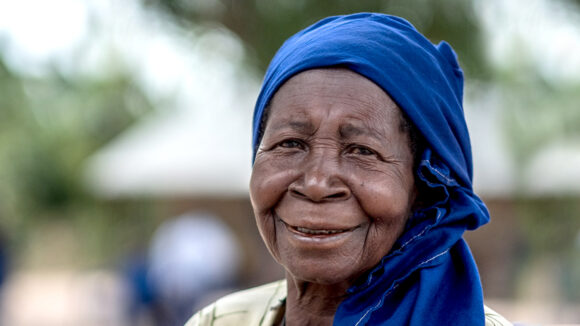We work with the government in Mozambique and countries across Africa to deliver vital charity work and make sure everyone has the chance to thrive.
Sightsavers in Mozambique

Mozambique is a large, sparsely populated country in southern Africa. It is one of the least developed countries in the world.
The country’s health care system is underfunded and lacks essential resources: health services focus on treating infectious diseases such as malaria, cholera and HIV. This means eye health is not prioritised, putting millions of people at risk of avoidable blindness.
Five neglected tropical diseases are present in Mozambique. River blindness, which is usually found near fast-flowing water such as the country’s Zambezi river, is a significant cause of illness and disability in the country.
In 2012, Mozambique ratified the UN Convention on the Rights of Persons with Disabilities. Yet people with disabilities still face barriers when accessing education, employment and health care. Ensuring eye care services are inclusive is key to addressing some of the inequalities that people with disabilities experience.
Mozambique facts
- Population: 32 million
- Capital: Maputo
- Official language: Portuguese
- Human development index (HDI) ranking: 185 (low)
What are the challenges in Mozambique, and how can these be addressed?

Eye care
Not everyone in Mozambique can get treatment for eye conditions when they need it.
When trying to access eye health services, many people face barriers including overcrowded hospitals, financial difficulty and a lack of awareness about treatments. Our charity work in the country is helping to ensure that everyone can access quality eye care.
Infectious diseases
People in Mozambique are at a very high risk of infectious diseases.
Several neglected tropical diseases that can be treated with medication are endemic in Mozambique, putting millions of people at risk of avoidable blindness and disability. Sightsavers’ work in the country focuses on protecting people from river blindness, trachoma and lymphatic filariasis.
“My favourite part of my work is seeing patients’ joy following sight-saving surgery when they have their bandages removed.”

How you can help
Our charity work in Mozambique is helping to improve eye care services, but there’s still more we need to do.
With your support, we want to continue providing inclusive eye care services and protect people from infectious diseases, so everyone can learn, earn and thrive. To do this, we need your help.
Charity donations, legacies, corporate partnerships and gifts from charitable foundations are a vital source of funding for our programmes in Mozambique. We also welcome opportunities to work in partnership with governments, institutions and development organisations.
![]() Contact us: If you have any questions about our work in Mozambique, would like more details about our programmes or wish to discuss ways to donate or support us, email ask-mozambique@sightsavers.org
Contact us: If you have any questions about our work in Mozambique, would like more details about our programmes or wish to discuss ways to donate or support us, email ask-mozambique@sightsavers.org
Latest stories from Mozambique

Eye care and COVID-19: what we’ve learned during the pandemic
Throughout the pandemic, our priority has been to restart our work quickly and safely. Sightsavers staff reveal our how eye care programmes have evolved in the past 18 months.

Research shows impact of Sightsavers’ work on eye health in Mozambique
Sightsavers has been working to strengthen eye health services in Mozambique since 2007. Now, new research shows exactly what we have achieved.

May 2021 update: highlights from around the world
In Pakistan, teachers have given insights into their experiences of vision screening in schools. Plus updates from Senegal, Mozambique and Nigeria.

February 2021 updates: highlights from around the world
An inclusive work programme in Kenya has helped farmers with disabilities launch a lucrative business. Plus news from Pakistan, Mozambique, Malawi and more.

November 2020 updates: highlights from around the world
Following rigorous safety measures, we have been able to restart our work fighting disease and saving sight all over the world.

“Representation means speaking for ourselves”
Eufémia Amela is Mozambique’s nominee for the UN disability committee: she has a physical disability after being affected by polio as a child. Hear her story and learn why she’s fighting for equality.

